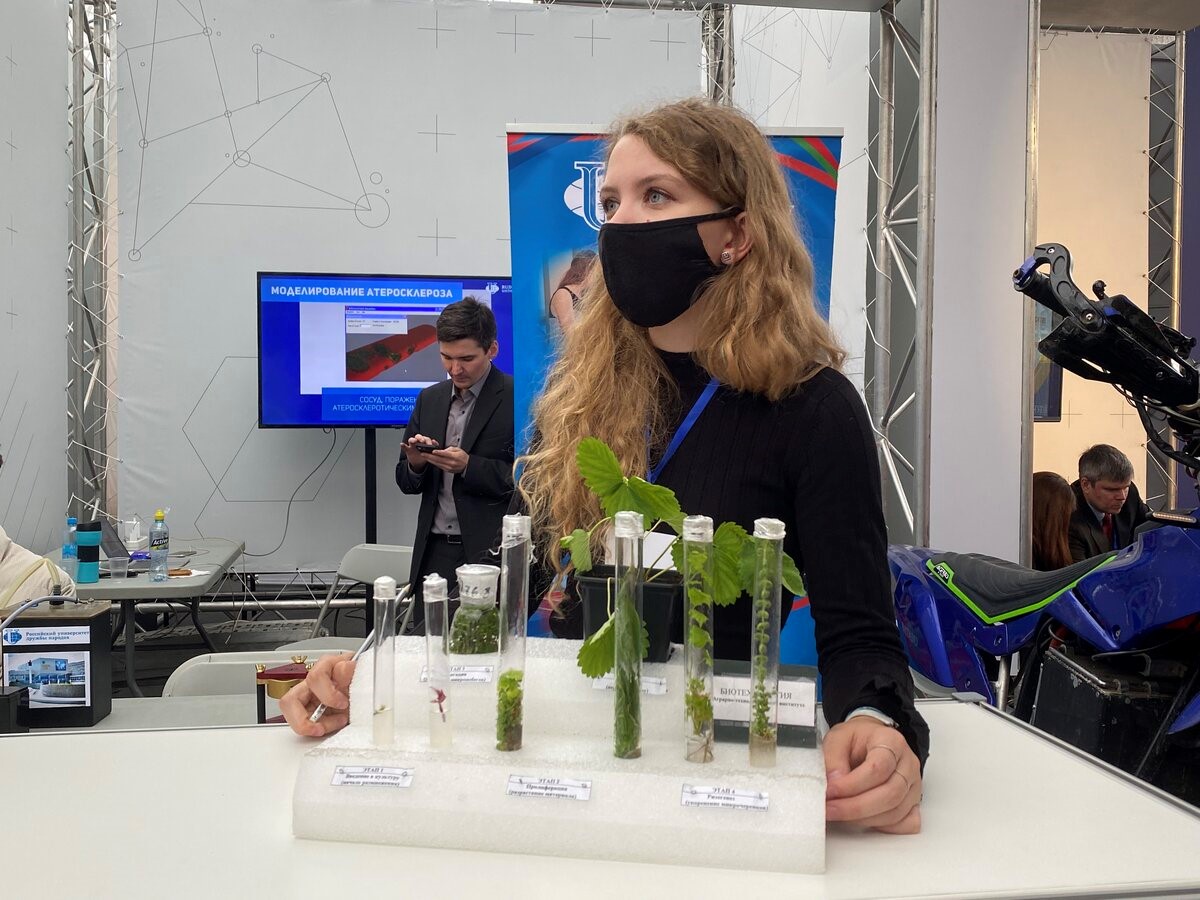The first day — and is a lot of opening!

The day for RUDN media volunteers began with a plenary session. Minister of the Ministry of Science and Higher Education of the Russian Federation Valery Falkov, Doctor of Physics and Mathematics, Laureate of the Presidential Prize for Young Scientists Ivan Osedlets, Aide to the President of the Russian Federation Andrey Fursenko, General Director of the Russian Society “Znanie” Maxim Dreval discussed key trends in the development of science and technology of Russia’s future. And also memorable scientific discoveries, the role of fundamental science in the life of society, financing of organizations and projects, the career trajectory of young scientists and support of scientists by domestic business.
“Thousands of people in our country are engaged in science to bring more comfort into our lives. I sincerely believe that Technosreda will contribute greatly to the development of science,” — said Valery Falkov. Technosreda hosted three sites (500 R&D projects, 20 Russian inventors, 30 technology companies) exhibiting medical exoskeletons, delivery robots, talking robots (some of them already working as museum guides, consultants and concierges), a prototype of a flying car, cyber prosthetic devises, and more.
RUDN presented its projects in the zone of universities and research institutes:
“Green Space Monitoring System.”
“How did it all start? There are many problems related to trees. The emphasis was on windthrow, a great detriment to the city. The municipality was supposed to be interested in reducing potential damage after extreme wind speeds in city conditions. This evolved as ecomonitoring because tree health is important, especially in this era. With our system we can predict the stability of a tree, its internal condition (diseases, root system and other things), and when it will fall.
“Sensors measure climatic indicators: humidity, air temperature. The best thing is not to save a sick tree, but to prevent it from getting sick. That is what these sensors are for. It all started with test sites in Italy, and then there were several sites in Moscow, St. Petersburg, and Apatity — the most different climatic zones for research,” — Sergey Bukin, PhD student Agrarian and Technological Institute RUDN and the University of Tuscia (Italy).
“The Territory project is a site that allows us to automatically identify different types of objects using satellite imagery data. We worked on three types: buildings, changes in forests, and quarries. Our project was at the junction of artificial intelligence — computer vision and remote sensing data interpretation. Various kinds of satellites fly over the Earth, including remote sensing satellites. These include meteorological satellites (weather data), radar satellites (environmental monitoring, ecological monitoring), and natural-resource satellites (we use these data). A natural-resources satellite contains optics — a large camera, which allows us to obtain images of the Earth’s surface with good quality resolution. How does this work? We developed neural network algorithms and trained the network — a person manually outlines the buildings on the image using special software. That is how the network is trained, and that is how it works. As a result, the network began to identify better than the human did. With the help of ‘Territory’ we can get both quantitative information and certain statistical data,” — said Anna Ostrovskaya, Higher School of Industrial Policy and Entrepreneurship (RUDN) Director
Andrii Kritchenkov, Candidate of Chemical Sciences, Associate Professor at the Department of Inorganic Chemistry, Faculty of Physics, Mathematics, and Natural Sciences, RUDN, talked about nanotechnology, smart packaging, and product storage.
RUDN chemists have developed a method to create a polymer film based on natural compounds using nanoparticles. “Smart” packaging made from such a film will increase the shelf life of products because it has antibacterial, antioxidant, and antimicrobial properties.
On September 24 RUDN University hеld the International Scientific Conference “Russia and Africa: Heritage of the Past, Opportunities of the Present, Prospects for the Future”, in Honor of the 100th Anniversary of Patrice Lumumba.
XXXII Russian National Congress “Man and Medicine” was held in Moscow, a key event for the medical and pharmaceutical community. Pavel Murzov, an assistant professor at the Department of Pharmacy Management and Economics at RUDN University, became the winner among thousands of participants. He presented a study on the rational use of Proton Pump Inhibitors (PPIs) in pediatrics.
Senezh Management Workshop completed the fourth module of the Management Talent Pool Development Program in Science, Technology, and Higher Education. The only participant from RUDN University was Alexander L. Chupin, PhD in Economics, Deputy Dean for Research at the Faculty of Economics.
On September 24 RUDN University hеld the International Scientific Conference “Russia and Africa: Heritage of the Past, Opportunities of the Present, Prospects for the Future”, in Honor of the 100th Anniversary of Patrice Lumumba.
XXXII Russian National Congress “Man and Medicine” was held in Moscow, a key event for the medical and pharmaceutical community. Pavel Murzov, an assistant professor at the Department of Pharmacy Management and Economics at RUDN University, became the winner among thousands of participants. He presented a study on the rational use of Proton Pump Inhibitors (PPIs) in pediatrics.
Senezh Management Workshop completed the fourth module of the Management Talent Pool Development Program in Science, Technology, and Higher Education. The only participant from RUDN University was Alexander L. Chupin, PhD in Economics, Deputy Dean for Research at the Faculty of Economics.